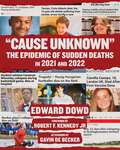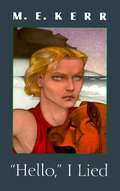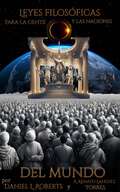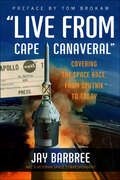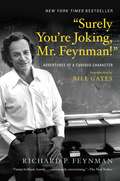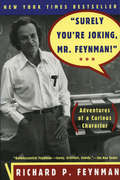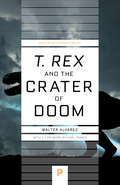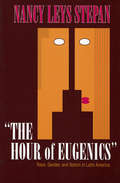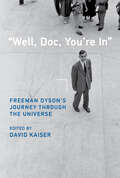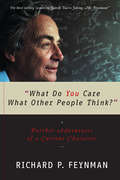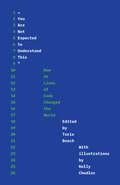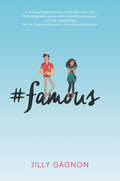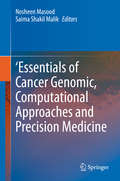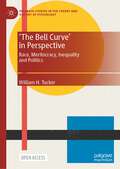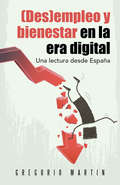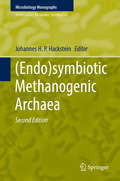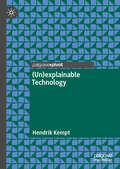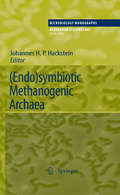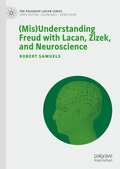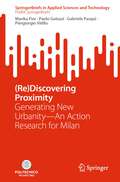- Table View
- List View
"Cause Unknown": The Epidemic of Sudden Deaths in 2021 & 2022 (Children’s Health Defense)
by Ed DowdWhat is killing young healthy Americans? Edward Dowd, a former Wall Street analyst and BlackRock portfolio manager, examines the epidemic of sudden deaths in America. Throughout his stock picking career, he utilized pattern recognition to get ahead of his peers and the street before his bullish or bearish thesis became consensus. Early in 2021, he noticed a rise of news anecdotes about sudden deaths among very fit athletes and other seemingly healthy young people across the country. His thesis was simple: What changed in 2021? . . . A mass vaccination campaign for Covid-19 was his conclusion. Over the course of 2021 and 2022, Edward amassed evidence from the insurance industry, funeral home industry, and government databases that excessive deaths among working-age Americans have increased in 2021 versus 2020 when vaccines were not available. This book will introduce you to some of the tragic stories that have occurred the last eighteen months and lay out the metadata to show readers that something profound changed in 2021 to cause the sudden rash of young deaths with Cause Unknown!
"Hello," I Lied
by M. E. KerrSummering in the Hamptons on the estate of a famous rock star, seventeen-year-old Lang tries to decide how to tell his longtime friends that he is gay, while struggling with an unexpected infatuation with a girl from France.
"Leyes filosóficas para la gente y las naciones del mundo.": "Explorando el Impacto de la Filosofía en la Legislación Global"
by Daniel L. Roberts1. Propuesta de Ley de Conservación: Se propone una ley que destine estímulos económicos del gobierno federal para invertir en proyectos de conservación, como la siembra de nubes y la reforestación, con el fin de combatir el calentamiento global y restaurar el suministro de agua. 2. Análisis sobre la Siembra de Nubes:Se discute cómo la modificación de los patrones climáticos afecta la formación de tormentas y se propone el uso de la siembra de nubes para restaurar los ciclos pluviales y combatir la sequía. 3. Propuesta de Ley de Solución Momentánea: Se presenta una ley que busca utilizar fondos federales para incentivar la adopción y reducir la tasa de natalidad, así como promover prácticas de construcción sostenible y reforestación para combatir el cambio climático. 4. Propuesta de Ley de Libertad de Aprendizaje:Se propone una legislación que brinde a los estudiantes la opción de asistir a la escuela solo dos días a la semana y dedicar el resto del tiempo a la educación en el hogar o el aprendizaje en línea, con el objetivo de proporcionar un entorno educativo más flexible y adaptado a las necesidades individuales de los estudiantes. En general, los textos abordan una variedad de temas, desde la conservación ambiental hasta la educación y la filosofía, con el objetivo común de proponer soluciones innovadoras para los desafíos actuales que enfrenta la sociedad.
"Live from Cape Canaveral": Covering the Space Race, from Sputnik to Today
by Jay Barbree“From Sputnik to the International Space Station, Jay Barbree has seen it all, and reported it well. ‘Live from Cape Canaveral’ encapsulates the most technically exciting half century in history.” –Neil ArmstrongSome fifty years ago, while a cub reporter, Jay Barbree caught space fever the night that Sputnik passed over Georgia. He moved to the then-sleepy village of Cocoa Beach, Florida, right outside Cape Canaveral, and began reporting on rockets that fizzled as often as they soared. In "Live from Cape Canaveral," Barbree—the only reporter who has covered every mission flown by astronauts—offers his unique perspective on the space program. He shares affectionate portraits of astronauts as well as some of his fellow journalists and tells some very funny behind-the-scenes stories—many involving astronaut pranks. Barbree also shows how much the space program and its press coverage have changed over time. Warm and perceptive, he reminds us just how thrilling the great moments of the space race were and why America fell in love with its heroic, sometimes larger-than-life astronauts.
"Surely You're Joking, Mr. Feynman!": Adventures of a Curious Character
by Bill Gates Ralph Leighton Richard P. FeynmanOne of the most famous science books of our time, the phenomenal national bestseller that "buzzes with energy, anecdote and life. It almost makes you want to become a physicist" (Science Digest). Richard P. Feynman, winner of the Nobel Prize in physics, thrived on outrageous adventures. In this lively work that “can shatter the stereotype of the stuffy scientist” (Detroit Free Press), Feynman recounts his experiences trading ideas on atomic physics with Einstein and cracking the uncrackable safes guarding the most deeply held nuclear secrets—and much more of an eyebrow-raising nature. In his stories, Feynman’s life shines through in all its eccentric glory—a combustible mixture of high intelligence, unlimited curiosity, and raging chutzpah. Included for this edition is a new introduction by Bill Gates.
"Surely You're Joking, Mr. Feynman!": Adventures of a Curious Character
by Ralph Leighton Richard P. FeynmanA New York Times bestseller--the outrageous exploits of one of this century's greatest scientific minds and a legendary American original. Richard Feynman, winner of the Nobel Prize in physics, thrived on outrageous adventures. Here he recounts in his inimitable voice his experience trading ideas on atomic physics with Einstein and Bohr and ideas on gambling with Nick the Greek; cracking the uncrackable safes guarding the most deeply held nuclear secrets; accompanying a ballet on his bongo drums; painting a naked female toreador. In short, here is Feynman's life in all its eccentric--a combustible mixture of high intelligence, unlimited curiosity, and raging chutzpah.
"T. rex" and the Crater of Doom
by Carl Zimmer Walter AlvarezSixty-five million years ago, a comet or asteroid larger than Mt. Everest slammed into the Earth, causing an explosion equivalent to the detonation of a hundred million hydrogen bombs. Vaporized impactor and debris from the impact site were blasted out through the atmosphere, falling back to Earth all around the globe. Terrible environmental disasters ensued, including a giant tsunami, continent-scale wildfires, darkness, and cold, followed by sweltering greenhouse heat. When conditions returned to normal, half the genera of plants and animals on Earth had perished.This horrific story is now widely accepted as the solution to a great scientific murder mystery what caused the extinction of the dinosaurs? In T. rex and the Crater of Doom, the story of the scientific detective work that went into solving the mystery is told by geologist Walter Alvarez, one of the four Berkeley scientists who discovered the first evidence for the giant impact. It is a saga of high adventure in remote parts of the world, of patient data collection, of lonely intellectual struggle, of long periods of frustration ended by sudden breakthroughs, of intense public debate, of friendships made or lost, of the exhilaration of discovery, and of delight as a fascinating story unfolded.Controversial and widely attacked during the 1980s, the impact theory received confirmation from the discovery of the giant impact crater it predicted, buried deep beneath younger strata at the north coast of the Yucatán Peninsula. The Chicxulub Crater was found by Mexican geologists in 1950 but remained almost unknown to scientists elsewhere until 1991, when it was recognized as the largest impact crater on this planet, dating precisely from the time of the great extinction sixty-five million years ago. Geology and paleontology, sciences that long held that all changes in Earth history have been calm and gradual, have now been forced to recognize the critical role played by rare but devastating catastrophes like the impact that killed the dinosaurs.
"T. rex" and the Crater of Doom
by Carl Zimmer Walter AlvarezSixty-five million years ago, a comet or asteroid larger than Mount Everest slammed into the Earth, inducing an explosion equivalent to the detonation of a hundred million hydrogen bombs. Vaporized detritus blasted through the atmosphere upon impact, falling back to Earth around the globe. Disastrous environmental consequences ensued: a giant tsunami, continent-scale wildfires, darkness, and cold, followed by sweltering greenhouse heat. When conditions returned to normal, half the plant and animal genera on Earth had perished.This horrific chain of events is now widely accepted as the solution to a great scientific mystery: what caused the extinction of the dinosaurs? Walter Alvarez, one of the Berkeley scientists who discovered evidence of the impact, tells the story behind the development of the initially controversial theory. It is a saga of high adventure in remote locations, of arduous data collection and intellectual struggle, of long periods of frustration ended by sudden breakthroughs, of friendships made and lost, and of the exhilaration of discovery that forever altered our understanding of Earth's geological history.
"T. rex" and the Crater of Doom
by Carl Zimmer Walter AlvarezSixty-five million years ago, a comet or asteroid larger than Mount Everest slammed into the Earth, inducing an explosion equivalent to the detonation of a hundred million hydrogen bombs. Vaporized detritus blasted through the atmosphere upon impact, falling back to Earth around the globe. Disastrous environmental consequences ensued: a giant tsunami, continent-scale wildfires, darkness, and cold, followed by sweltering greenhouse heat. When conditions returned to normal, half the plant and animal genera on Earth had perished.This horrific chain of events is now widely accepted as the solution to a great scientific mystery: what caused the extinction of the dinosaurs? Walter Alvarez, one of the Berkeley scientists who discovered evidence of the impact, tells the story behind the development of the initially controversial theory. It is a saga of high adventure in remote locations, of arduous data collection and intellectual struggle, of long periods of frustration ended by sudden breakthroughs, of friendships made and lost, and of the exhilaration of discovery that forever altered our understanding of Earth's geological history.
"The Hour of Eugenics": Race, Gender, and Nation in Latin America
by Nancy Leys StepanEugenics was a term coined in 1883 to name the scientific and social theory which advocated "race improvement" through selective human breeding. In Europe and the United States the eugenics movement found many supporters before it was finally discredited by its association with the racist ideology of Nazi Germany. Examining for the first time how eugenics was taken up by scientists and social reformers in Latin America, Nancy Leys Stepan compares the eugenics movements in Mexico, Brazil, and Argentina with the more familiar cases of Britain, the United States, and Germany. In this highly original account, Stepan sheds new light on the role of science in reformulating issues of race, gender, reproduction, and public health in an era when the focus on national identity was particularly intense. Drawing upon a rich body of evidence concerning the technical publications and professional meetings of Latin American eugenicists, she examines how they adapted eugenic principles to local contexts between the world wars. Stepan shows that Latin American eugenicists diverged considerably from their counterparts in Europe and the United States in their ideological approach and their interpretations of key texts concerning heredity.
"Well, Doc, You're In": Freeman Dyson’s Journey through the Universe
by Edited by David KaiserThe life and work of Freeman Dyson—renowned scientist, visionary, and iconoclast—and his particular way of thinking about deep questions.Freeman Dyson (1923–2020)—renowned scientist, visionary, and iconoclast—helped invent modern physics. Not bound by disciplinary divisions, he went on to explore foundational topics in mathematics, astrophysics, and the origin of life. General readers were introduced to Dyson&’s roving mind and heterodox approach in his 1979 book Disturbing the Universe, a poignant autobiographical reflection on life and science. &“Well, Doc, You&’re In&” (the title quotes Richard Feynman&’s remark to Dyson at a physics conference) offers a fresh examination of Dyson&’s life and work, exploring his particular way of thinking about deep questions that range from the nature of matter to the ultimate fate of the universe. The chapters—written by leading scientists, historians, and science journalists, including some of Dyson&’s colleagues—trace Dyson&’s formative years, his budding interests and curiosities, and his wide-ranging work across the natural sciences, technology, and public policy. They describe Dyson&’s innovations at the intersection of quantum theory and relativity, his novel nuclear reactor design (and his never-realized idea of a spacecraft powered by nuclear weapons), his years at the Institute for Advanced Study, and his foray into cosmology. In the coda, Dyson&’s daughter Esther reflects on growing up in the Dyson household. &“Well, Doc, You&’re In&” assesses Dyson&’s successes, blind spots, and influence, assembling a portrait of a scientist&’s outsized legacy. ContributorsJeremy Bernstein, Robbert Dijkgraaf, Esther Dyson, George Dyson, Ann Finkbeiner, Amanda Gefter, Ashutosh Jogalekar, David Kaiser, Caleb Scharf, William Thomas
"What Do You Care What Other People Think?": Further Adventures of a Curious Character
by Ralph Leighton Richard P. FeynmanThe New York Times best-selling sequel to "Surely You're Joking, Mr. Feynman!" One of the greatest physicists of the twentieth century, Richard Feynman possessed an unquenchable thirst for adventure and an unparalleled ability to tell the stories of his life. "What Do You Care What Other People Think?" is Feynman's last literary legacy, prepared with his friend and fellow drummer, Ralph Leighton. Among its many tales--some funny, others intensely moving--we meet Feynman's first wife, Arlene, who taught him of love's irreducible mystery as she lay dying in a hospital bed while he worked nearby on the atomic bomb at Los Alamos. We are also given a fascinating narrative of the investigation of the space shuttle Challenger's explosion in 1986, and we relive the moment when Feynman revealed the disaster's cause by an elegant experiment: dropping a ring of rubber into a glass of cold water and pulling it out, misshapen.
"You Are Not Expected to Understand This": How 26 Lines of Code Changed the World
by Kelly ChudlerLeading technologists, historians, and journalists reveal the stories behind the computer coding that touches all aspects of life—for better or worseFew of us give much thought to computer code or how it comes to be. The very word “code” makes it sound immutable or even inevitable. “You Are Not Expected to Understand This” demonstrates that, far from being preordained, computer code is the result of very human decisions, ones we all live with when we use social media, take photos, drive our cars, and engage in a host of other activities.Everything from law enforcement to space exploration relies on code written by people who, at the time, made choices and assumptions that would have long-lasting, profound implications for society. Torie Bosch brings together many of today’s leading technology experts to provide new perspectives on the code that shapes our lives. Contributors discuss a host of topics, such as how university databases were programmed long ago to accept only two genders, what the person who programmed the very first pop-up ad was thinking at the time, the first computer worm, the Bitcoin white paper, and perhaps the most famous seven words in Unix history: “You are not expected to understand this.”This compelling book tells the human stories behind programming, enabling those of us who don’t think much about code to recognize its importance, and those who work with it every day to better understand the long-term effects of the decisions they make.With an introduction by Ellen Ullman and contributions by Mahsa Alimardani, Elena Botella, Meredith Broussard, David Cassel, Arthur Daemmrich, Charles Duan, Quinn DuPont, Claire L. Evans, Hany Farid, James Grimmelmann, Katie Hafner, Susan C. Herring, Syeda Gulshan Ferdous Jana, Lowen Liu, John MacCormick, Brian McCullough, Charlton McIlwain, Lily Hay Newman, Margaret O’Mara, Will Oremus, Nick Partridge, Benjamin Pope, Joy Lisi Rankin, Afsaneh Rigot, Ellen R. Stofan, Lee Vinsel, Josephine Wolff, and Ethan Zuckerman.
#DoNotDisturb: How I Ghosted My Cell Phone to Take Back My Life
by Jedediah BilaHave you ever looked at your email, then texts, then Facebook, then Twitter, then email, then Instagram, then Candy Crush, then texts, then Snapchat, then texts again, and now you’ve wasted the time you had set aside for more important things? Jedediah Bila has solved her own Obsessive Compulsive Tech Disorder, and she did it without throwing away her devices.It's time to switch on airplane mode and settle into Jedediah Bila’s #DoNotDisturb: How I Ghosted My Cell Phone to Take Back My Life.In this timely, entertaining and inspiring book, Jedediah Bila chronicles her chaotic, confusing, and all-consuming love-hate relationship with - her cell phone. Stepping back from the whirlwind of texting, social media, and an endless sea of apps, Bila questions how our relationships, character, and sanity have suffered from our deep dive into the digital abyss. Exploring the toll that tech addiction took on her life, Bila reveals her missteps and mistakes, including several upending, life-altering months swirling in an ex-boyfriend’s cell-phone-enabled double life, and how a low-tech millennial later stole her heart.Travel with Jedediah through the embarrassing and catastrophic consequences of Ménage-a-Tech relationships, social media's Perception Deception, and the One-Potato-Chip-Problem of trying to resist Silicon Valley's hypnotic, slot-machine software designed to lure you in. Bila reveals how she navigated away from an unhealthy, oversaturated diet of tech junk food to striking just the right balance with technology to let her unplugged, real-life moments take charge. In #DoNotDisturb, Bila applies her trademark no-nonsense, common-sense, personal responsibility and accountability-centered approach, warning us that if we don’t stop acting like robots, our very humanity is at stake. Through warm anecdotes and cold, hard truths, Bila reveals how she pulled her way out of the tech fog to keep her eyes focused on the life right in front of her. And how you can too.
#famous
by Jilly GagnonDebut author Jilly Gagnon bursts onto the scene with a story equal parts bite and romance, perfect for fans of Jenny Han and Jennifer E. Smith, about falling for someone in front of everyone. In this modern day love story: Girl likes boy. Girl snaps photo and posts it online. Boy becomes insta-famous. And what starts out as an innocent photo turns into a whirlwind adventure that forces them both to question whether fame—and love—are worth the price…and changes both of their lives forever. Told from alternating points of view, #famous captures the sometimes-crazy thrill ride of social media and the equally messy but wonderful moments of liking someone in real life.
'Essentials of Cancer Genomic, Computational Approaches and Precision Medicine
by Nosheen Masood Saima Shakil MalikThis book concisely describes the role of omics in precision medicine for cancer therapies. It outlines our current understanding of cancer genomics, shares insights into the process of oncogenesis, and discusses emerging technologies and clinical applications of cancer genomics in prognosis and precision-medicine treatment strategies. It then elaborates on recent advances concerning transcriptomics and translational genomics in cancer diagnosis, clinical applications, and personalized medicine in oncology. Importantly, it also explains the importance of high-performance analytics, predictive modeling, and system biology in cancer research. Lastly, the book discusses current and potential future applications of pharmacogenomics in clinical cancer therapy and cancer drug development.
'The Bell Curve' in Perspective: Race, Meritocracy, Inequality and Politics (Palgrave Studies in the Theory and History of Psychology)
by William H. TuckerThis open access book examines the implications of The Bell Curve for the social, economic, and political developments of the early 21st century. Following a review of the reception of The Bell Curve and its place in the campaign to end affirmative action, Professor Tucker analyses Herrnstein’s concept of the “meritocracy” in relation to earlier 20th century eugenics and the dramatic increase in economic inequality over the past 30 years. Tucker demonstrates how, contrary to The Bell Curve’s predictions, the reallocation of these huge sums was neither rational nor beneficial for society. The book moves on to situate The Bell Curve within contemporary politics and shows how it can be seen to have played a role in the 2016 US election. This compelling analysis will appeal to scholars and those with an interest in the history of scientific racism, the history of psychology and the sociology of knowledge and science.This is an open access book.
(Des)empleo y bienestar en la era digital: Una lectura desde España
by Gregorio MartínEmpezar el debate de la falta de empleo y de todo lo que supone la tecnología digital Hablar simultáneamente de ganar bienestar y desempleo suena a contradictorio en nuestra actual concepción y escala de valores, ya que se nos hace difícil pensar que una persona pueda experimentar simultáneamente un incremento en su bienestar individual, cuando tiene dificultades para conseguir una legítima compensación económica derivada de su trabajo. <P><P> Sin embargo, por paradójico que resulte, es un hecho que la persona pueda beneficiarse de lo digital como consumidor y en cambio verse perjudicado como productor. <P><P>Estamos en las primeras etapas de una época de grandes cambios asociados al conocimiento y su aplicación por la tecnología. Las innovaciones digitales están rehaciendo la industria, la economía y la sociedad al igual que el vapor, la electricidad y de combustión interna hicieron antes. <P>La revolución digital es la mejor noticia económica del planeta tanto por las nuevas formas de fabricar cosas materiales, como para la obtención de productos cognitivos e inmateriales. <P>La digitalización incrementa la tarta de la riqueza y del bienestar pero ninguna ley dice que debe beneficiar a todos por igual y de hecho los beneficios económicos y laborales de esta oleada tecnológica están siendo muy desiguales, hoy la mayoría puede sentir que vive en peores condiciones económicas, aunque todos disfrutemos diariamente de las posibilidades de lo digital. <P>La digitalización destruye muchos más puestos de los que pueda crear por lo que se plantean situaciones muy espinosas. Anteriores revoluciones aumentaron considerablemente la demanda de mano de obra, así como un trabajo sostenido con crecimientos salariales. Las evidencias llevan a preguntarse si esta vez las cosas son diferentes. <P>En un camino que va de la tecnología al empleo, pasando por aquellos aspectos que mejoran la sensación de bienestar en estetexto acabamos planteando la pregunta de: ¿Cómo se organiza una sociedad en la que muchas personas a través de su ocupación ya no puedan obtener recompensas aceptables?
(Endo)symbiotic Methanogenic Archaea
by Johannes H. HacksteinThis updated monograph deals with methanogenic endosymbionts of anaerobic protists, in particular ciliates and termite flagellates, and with methanogens in the gastrointestinal tracts of vertebrates and arthropods. Further chapters discuss the genomic consequences of living together in symbiotic associations, the role of methanogens in syntrophic degradation, and the function and evolution of hydrogenosomes, hydrogen-producing organelles of certain anaerobic protists. Methanogens are prokaryotic microorganisms that produce methane as an end-product of a complex biochemical pathway. They are strictly anaerobic archaea and occupy a wide variety of anoxic environments. Methanogens also thrive in the cytoplasm of anaerobic unicellular eukaryotes and in the gastrointestinal tracts of animals and humans. The symbiotic methanogens in the gastrointestinal tracts of ruminants and other “methanogenic” mammals contribute significantly to the global methane budget; especially the rumen hosts an impressive diversity of methanogens. This makes this updated volume an interesting read for scientists and students in Microbiology and Physiology.
(Un)explainable Technology
by Hendrik KemptThis book explores the issue of (un)explainable technology. As we face technologies, mostly autonomous, machine-learned algorithms (AI) that elude a seamless explanation on how they work (“black boxes”), several issues both from an epistemological as well as ethical perspectives emerge. It is thus not surprising that there are plenty of technological attempts in illuminating the black box as well as philosophical efforts in conceptualizing and re- assessing our concepts of an explanation and understanding, as well emerging ethical questions on how to deal with this unexplainable technology. This book thus offers a succinct and comprehensive, opinionated but fair view on the emerging ethical debate on explainability of AI and its relevance for using AI for different more or less sensitive decision-making procedures. As a short book, the goal is to introduce the reader to the issues at hand while also offering normative arguments from different sides that motivate, complicate, and resolve these issues.
**Missing** (Microbiology Monographs #19)
by Johannes H.P. HacksteinMethanogens are prokaryotic microorganisms that produce methane as an end-product of a complex biochemical pathway. They are strictly anaerobic archaea and occupy a wide variety of anoxic environments. Methanogens also thrive in the cytoplasm of anaerobic unicellular eukaryotes and in the gastrointestinal tracts of animals and humans. The symbiotic methanogens in the gastrointestinal tracts of ruminants and other "methanogenic" mammals contribute significantly to the global methane budget. This monograph deals with methanogenic endosymbionts of anaerobic protists, in particular ciliates and termite flagellates, and with methanogens in the gastrointestinal tracts of vertebrates and arthropods. Further reviews discuss the genomic consequences of living together in symbiotic associations, the role of methanogens in syntrophic degradation, and the function and evolution of hydrogenosomes, hydrogen-producing organelles of certain anaerobic protists.
**Missing** (The Palgrave Lacan Series)
by Robert SamuelsThis book sets out to clarify five key Freudian concepts (the pleasure principle, the primary processes, the unconscious, transference, and the reality principle) elaborated early on in Freud’s work but, it is argued, rarely understood—even by psychoanalysts themselves. It examines in turn the post-Freudian paradigms employed in neuropsychoanalysis, Lacan, Zizek, object relations, and psychoanalytic approaches to identity politics, and in doing so reveals the extent to which they have been distorted and repressed in these new contexts. Over the course of the book the author demonstrates how Freud’s unpublished Project for a Scientific Psychology can be seen as a complete system of core concepts that both ground psychoanalysis in neurology and also introduce a vital challenge to the brain sciences. This book will appeal to students and scholars of psychoanalysis, clinical psychology, and psychoanalytic theory.
**Missing**: Generating New Urbanity—An Action Research for Milan (SpringerBriefs in Applied Sciences and Technology)
by Gabriele Pasqui Marika Fior Paolo Galuzzi Piergiorgio VitilloThis book explores the topic of proximity and its relations in the design of contemporary urban fabrics and public spaces. The effects of the COVID-19 pandemic and reflections on the future of cities have lately shed light on the concept of proximity, which is intended as the relationship between communities and urban functions and as relations among people, built spaces, and open spaces. The proximity is a historic and fertile field of interest for American and Northern European urban studies; it is a spatial and social program seemingly surpassed by the styles and rhythms of contemporary city life, but today it is back in vogue with different purposes. Meanwhile, the action research developed by the Department of Architecture and Urban Studies at the Politecnico di Milano for the Municipality of Milan reached its conclusion (2018–2020). The research work focused on contextualizing the new M4 Metro line stations under construction, and jointed mobility flows and places, long-range networks and local ones, boosting the idea of metro stations as regenerative urban thresholds and urban platforms for enabling environmental, sustainable settlement, and active mobility systems. In other words, the action research for Milan shows how to achieve the concept of proximity in the urban design practice in a dense, stratified, and complex urban context.
0606 Vigyan - Himachal Pradesh Board
by Himachal Pradesh School Siksha BoardThis book is the basic text book of subject science prescribed by the himachal pradesh board for the students of class 6th. The accessible version of the book doesn’t leave any part of the book. Students and aspiring civil servants must read this to get success in the state and national level examinations.
0706 Vigyan class 7 - Himachal Pradesh Board: 0706 विज्ञान वर्ग 7 - हिमाचल प्रदेश बोर्ड
by Himachal Pradesh School Shiksha BoardThis book is the basic text book of subject Science prescribed by the himachal pradesh board for the students of class seven. The accessible version of the book doesn’t leave any part of the book. Students and aspiring civil servants must read this to get success in the state and national level examinations.
